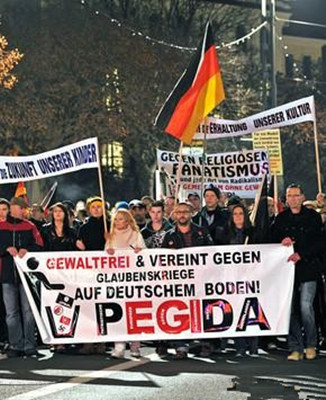德國仇外
Peaceful, but menacing
和平的方式也具有威脅性
A new movement with a barely hidden message of hate unsettles Germany
一場隱藏著仇恨信息的新運動使德國動蕩不安
We don't need no Muslims here
我們不需要穆斯林
CALLING themselves Pegida, or “patriotic Europeans against the Islamisation of the Occident”, since October they have marched through Dresden every Monday. Their numbers are growing: on December 15th 15,000 protested. Their slogans of xenophobic paranoia (“No sharia in Europe!”) seem bizarre in Saxony, where only 2% of the population is foreign and fewer than 1% are Muslim.
就叫這群人Pegida吧,或者是“反對西方伊斯蘭化的愛國歐洲人”。他們自10月起每周一就游行穿行德累斯頓。他們的人數在壯大:截至12月15日抗議者已達到15000.他們偏執排外的口號(“歐洲拒絕伊斯蘭!”)在外來人口僅2%、其中穆斯林所占比例不到1%的薩克森顯得匪夷所思。

The marchers make no attempt to explain their demands. Convinced of a conspiracy of political correctness, they do not speak to the press. Few bear any signs of neo-Nazism. They have eschewed violence. What they share is broad anxiety about asylum-seekers (200,000 in 2014) and immigrants.
游行者們并未試圖去解釋他們的訴求。由于相信政治正確性的陰謀論,他們拒絕與媒體對話。他們并沒有任何新納粹主義的舉動,而是避免暴力。他們共有的只是對難民(2014年達到了20萬)和移民的廣泛擔憂。
The instigator is Lutz Bachmann, owner of an ad agency who once fled to South Africa to avoid being locked up for dealing drugs. He has imitators in other cities: Bonn has a Bogida march, Würzburg a Wügida. But eastern Germany, especially Dresden, is the movement's base. Counter-demonstrations have sprung up, but their numbers in Dresden (about 5,600 this week) are dwarfed by Pegida's. Chancellor Angela Merkel accused Pegida of “agitation and defamation”; Heiko Maas, the justice minister, called it a “disgrace for Germany”.
這場運動的煽動者是Lutz Bachmann,他名下有一家廣告公司,并曾為了逃避因毒品交易入獄而逃往南非。他在其它城市也有模仿者:波恩有一個名為Würzburg a Wügida的Bogida游行。但是東德,尤其是德累斯頓,是這場運動的大本營。反游行派也如雨后春筍般涌現,但他們在德累斯頓的人數(本周大約5600人)與Pegida相比就相形見絀了。總理安吉拉·默克爾指責Pegida“煽動和誹謗”;司法部長Heiko Maas則稱這為“德國的恥辱”。
But the CSU, a centre-right party in Bavaria that governs with Mrs Merkel, was more nuanced. Calling Pegida a disgrace amounted to “a massive denigration of peaceful protesters,” said a spokesman. The CSU had made news by saying that foreigners should be forced to speak German even “in the family”, though it later backtracked. The leader of the new anti-euro party, Alternative for Germany, Bernd Lucke, said he considered Pegida's demands “legitimate”.
但是默克爾掌管的巴伐利亞的中右翼黨派CSU卻態度微妙。他們稱Pegida為恥辱等同于是對“和平抗議者的大規模詆毀,”一名發言人如是說。CSU發表新聞稱外國人“即便是在家里”也應該被強制說德語,盡管這條新聞后來被撤銷。新反歐黨派德國新選項黨的領導人Bernd Lucke稱他認為Pegida的要求是“合理的”。
Germany remains a tolerant place, one reason why some 465,000 migrants arrived last year, making it the world's second most popular destination after America. But Pegida is a reminder that many, especially in eastern Germany, harbour resentments that can be exploited. “We are the people,” the marchers in Dresden shouted. It was the phrase East Germans used in 1989 in protest against their communist overlords. To outsiders, the cry now sounds chilling.
德國仍舊處于容忍狀態,這是去年約465,000名移民來到德國的原因之一,同時這也使德國成為僅次于美國的第二大移民地。但是Pegida正警示了在很多地方,尤其是東德,港口怨恨可以被利用。“我們才是這個國家的主人,”德累斯頓的游行者們高聲疾呼。這是東德人民在1989年抗議他們的共產主義霸主所用的口號。在外人看來,這怒吼如今聽上去讓人不寒而栗。譯者:邵夏沁 校對:王穎












